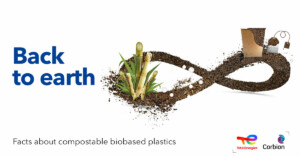
Maelenn Macedo-Ravard, Regulatory and Sustainability Manager at TotalEnergies Corbion BV
Read below a guest article by Maelenn Macedo-Ravard, Regulatory and Sustainability Manager at TotalEnergies Corbion BV.
Plastic recycling is far from reaching its targets included in the different waste legislations worldwide. Of all plastic produced since 1950, only 9% has ever been recycled. The efficacy of conventional recycling of plastic faces numerous challenges. Many traditional plastics are uneconomical to recycle and can only be downcycled once. The contamination of plastic waste, e.g., packaging or bin liners, through food and drinks makes conventional recycling not viable, and causes waste to be destined for landfilling or incineration. Instead, using compostable solutions, e.g., for food packaging, would help to divert food waste from non-recycling processes.
Building a sustainable economy and reaching the EU’s target of climate neutrality in 2050 requires innovative materials and improvements in waste management. Polylactic acid (PLA), a bio-based, recyclable, and compostable material, can make important contributions towards achieving a circular economy. Advanced recycling allows PLA to be repurposed and reused, and its compostability offers a further efficient end-of-life option.
Separate biowaste collection is currently far from reaching its full potential, considering that food waste is the most valuable source for creating compost. It’s sobering that in the EU27+ the current capture rate of food waste only reaches 16 percent of its theoretical potential. The absence of separate collection and treatment for biowaste means that it will end up in landfills or incineration, releasing greenhouse gases.
Scientific studies conducted in different European countries proved that EN 13432-certified compostable bioplastics are compatible with existing industrial composting facilities. In a Dutch industrial composting plant, compostable bioplastics disintegrated faster than orange peels or paper, and PLA teabags degraded in less than 22 days. The results of these studies are summarized in a TotalEnergies Corbion’s case study entitled “A comprehensive look at compostable plastics”.
Plastic packaging will always be required for hygiene, convenience, and functionality. Bio-based, compostable bioplastics like PLA fulfil all these criteria and contribute to climate change mitigation with a reduced carbon footprint and circular end-of-life options.
Find out more about the advantages of compostable plastics and visit the TotalEnergies Corbion website.
